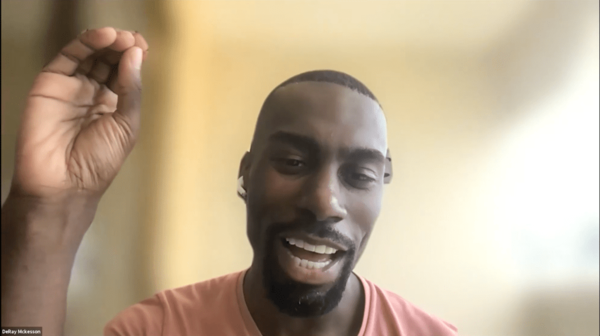
Civil rights activist and author DeRay Mckesson recently spoke on the future of policing as part of the Klau Center's “Building an Anti-Racist Vocabulary” lecture series.
Mckesson, a 2007 graduate of Bowdoin College, worked as a sixth-grade teacher and school administrator before quitting his job in March 2015 to begin a career of political activism. Five months later, he and fellow activists launched Campaign Zero, a 10-point policy plan for ending police violence in the United States. Mckesson is also the host of the political podcast “Pod Save the People” and the author of On the Other Side of Freedom, a memoir detailing his experience as an organizer in Ferguson during the birth of the Black Lives Matter movement.
Mckesson preceded the discussion with a simple clarification — while many consider the fight for police reform to be a multi-generational struggle, he expects shorter-term success.
“We believe that we can win in this lifetime,” he said. “I don’t think I’m working on a 700-year solution or a 500-year solution. We really do believe that with good organizing, we can win in this lifetime.”
And Mckesson’s definition of “win” is a simple one. To him, in a country where police have killed more than 1,000 people a year since 2013, winning means no police killings, any and every year — hence the “Zero” of Campaign Zero.
Although Mckesson and his fellow organizers are interested in broad, structural policy changes, they abide by a small-scale mantra: “One is the biggest number.”
“When one is your sister, or one is your brother, or one is your mother or one is your cousin, you don’t need 1000 … One is enough,” Mckesson said. “There are some [aspects of our work] that will impact hundreds of people, there are some things that will impact thousands of people, there are some things that will impact 10 or 20 people — and all of them matter.”
Mckesson then went on to detail his approach to the reimagination of policing: a deconstruction of the “logic” of policing itself.
“The logic of policing says there are people with power who set rules, policies and practices, and the enforcement is the logic of policing,” he said. “That enforcement is often violent and disproportionate toward people of color, poor people and it is harsh.”
And although many organizers believe in only the complete eradication of this logic, Mckesson argued that efforts toward abolition can and should exist in conversation with efforts to change existing systems in small ways, using the topic of solitary confinement as an example.
“The end of solitary confinement is not the end of incarceration. Does that mean that these two strategies are against each other? It doesn’t,” Mckesson said. “One is an acknowledgement that we have a responsibility to real people’s lives today … That does not take away from the demand, the urgency of undoing the carceral state.”
In response to a question from Klau Center associate director Dory Mitros Durham about effective strategies for engendering policy changes, Mckesson noted the simple power of accessible information — when 8 Can’t Wait, an initiative of Campaign Zero, launched following the killing of George Floyd, the program’s dissemination of public data resulted in surprising amounts of mobilization at the local level.
“When we released 8 Can’t Wait … we did not fight police departments, we just made the data public — and citizens fought police departments,” Mckesson said. “And that’s why we keep everything public.”
Mckesson also discussed how the mechanisms of change differ at local and federal levels. While policy proposals such as the George Floyd Justice in Policing Act would result in some positive change, such as greatly reducing the legal use of neck restraints, the federal government’s only means of impacting the policies of police departments is to threaten the withholding of funds, he explained.
“The hard thing is that the federal government has never followed through on that threat to police departments,” Mckesson said. “So while I’m interested in that aspect of the law, we just haven’t seen it enforced.”
But one change the federal government — President Biden in particular — could make at any time, Mckesson noted, is the release of people detained in private facilities by Immigration and Customs Enforcement (ICE). Federal agencies under the Department of Homeland Security are exempt from many acts targeting police reform, and Biden’s recent executive order only aims to end the use of private prisons under the Department of Justice — leaving private ICE facilities largely immune to both reform and abolition.
“And Biden has the power tomorrow to stop that, with no trouble,” Mckesson said. “So those are the things we should be demanding of the federal government.” Additionally, while Biden’s aforementioned executive order is a step in the right direction, that order and others like it only solve a portion of the problem, Mckesson argued — only about 8% of incarcerated people are held in private prisons.
In conclusion, Mckesson addressed a question on many American’s minds today: Now that citizens are armed with a wealth of information on systemic racism and corrupt policing, what are the next steps?
“I think the moment you know your question, you’ll do your best work,” he answered. “I wake up every day saying ‘How do we get to zero?’ … And because I am chasing that question every day, it guides my work.”
And that guiding question will look different for everyone, Mckesson noted.
“For some people, that question will be about policing, or the carceral state or the climate,” he said. “When you know your question, the rest will just fall into place.”
Originally published May 3, 2021, in the Observer.